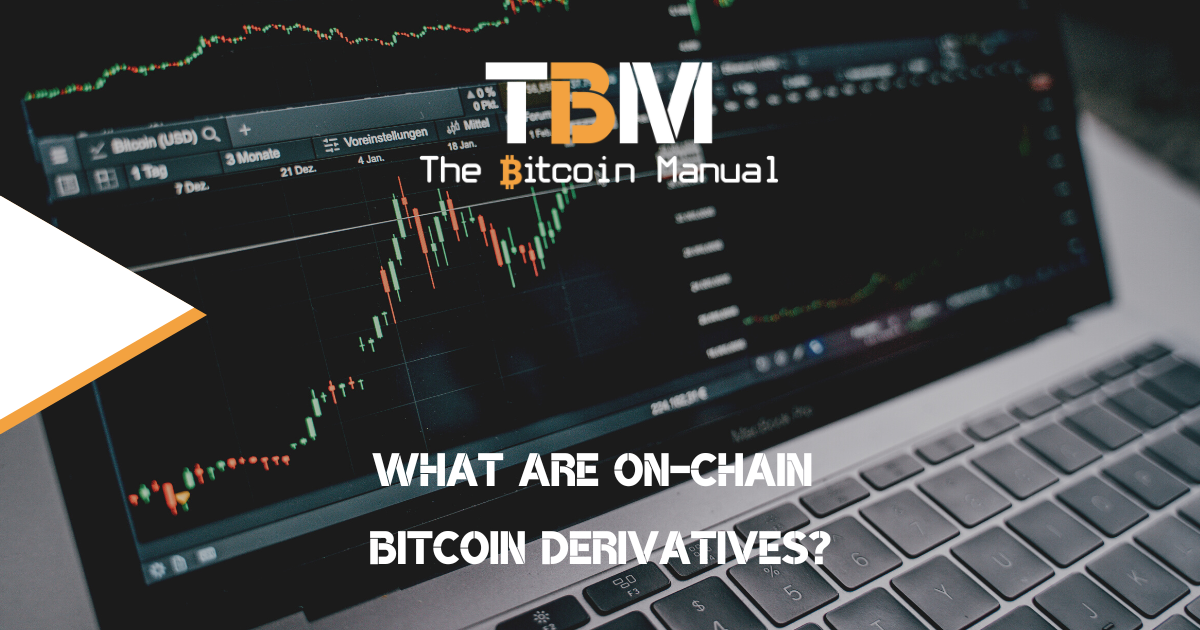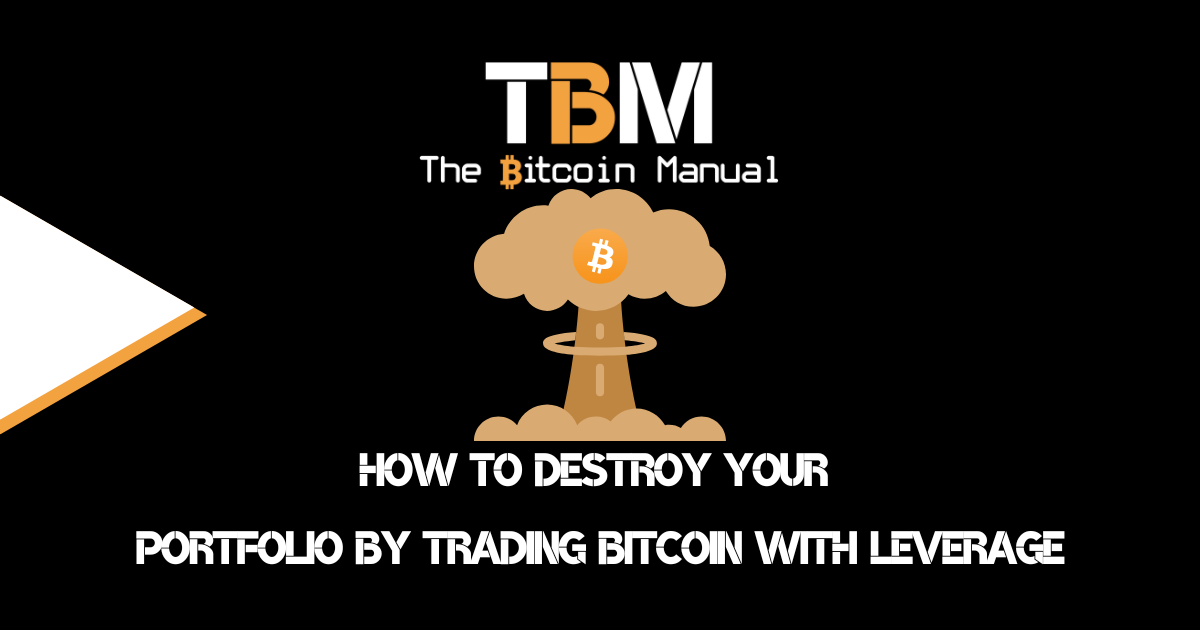Trading Bitcoin comes in different forms; it depends on the trader’s intent, their access to the market, and the risks each trader is comfortable with while being an active market participant. As a retail trader who is comfortable with custodial risk, you could trade on centralised platforms that offer spot markets for fiat and Bitcoin or Stablecoins and Bitcoin.
If you’re uncomfortable with giving up ownership of your funds, or KYC puts you off, your trading would likely be done via P2P platforms or on-chain automatic market makers.
If you’re looking to take more risk with your capital or are already participating in the spot market and looking to hedge your positions there, then Derivatives markets would appeal to you.
What are Bitcoin derivatives?
Derivatives are financial contracts between two or more parties that derive their value from the price of an underlying asset or index (“the underlying”); in this case, the asset is Bitcoin.
Beyond the naturally offsetting positions in the spot market, derivatives are also used as an efficient medium for speculation, allowing for leverage and enabling users to gain long or short exposure without physically acquiring the underlying.
Typically, derivatives are issued by a custodian who will provide you with the leverage or custody of your funds required to take the position, but as we’ve seen with crypto custodians, they have not had the greatest track record of remaining solvent.
This fear of exchanges going bankrupt or locking you out of your capital due to liquidity issues has seen some traders opting to move their trading on-chain instead.
What are on-chain derivatives?
On-chain derivatives are financial contracts that are traded directly on a blockchain, or the trade can be done client side with the settlement done on the blockchain without the need for a central intermediary.
This type of trading makes them more transparent, secure, faster and efficient than traditional derivatives contracts, which are typically traded on centralised exchanges.
DeFi derivatives are similar to their counterparts in TradFi, as they perform the same service of offering securitised contracts that give their owners exposure to an asset’s value and the ability to hedge price risk without owning the asset.
But where they deviate is in the manner of custody and issuance, as derivatives can be created as tokens that are issued automatically via preprogrammed smart contracts hosted on a blockchain. Derivative products include futures, options, swaps, forward contracts, prediction markets, and collateralised loans.
Some DeFi derivatives products offer investors the opportunity to develop synthetic assets whose values are tied to underlying real-world assets. DeFi derivatives are practically smart contracts that eliminate the role of a broker. In other words, in DeFi, the terms of derivatives are fulfilled on-chain by smart contracts.
Why derivatives could be coming to Bitcoin
Considering the growing number of Bitcoin holders, the increasing market cap to settle larger transactions, and the ease of access to the market for issuers of financial products, having tokenised securities that settle in Bitcoin will become more popular. This is a bet the Liquid Network is making with their AMP token issuance option and the work Blockstream has done in formalising a security token issuance on this sidechain.
DEFI on Bitcoin is still considerably small, especially compared to the amount of products, capital and trading happening on Ethereum and the various EVM chains like Ethereum. If there is considerable demand for these types of products from Bitcoin holders, these smart contracts could be moved to a Bitcoin EVM sidechain like Rootstock.
DeFi derivatives are poised to transform not just the derivatives market but also the overall securities market. According to investment firm BlackRock, the next generation of securities markets will be the tokenisation of assets through distributed ledgers.
What products can be traded on-chain?
Some of the most common types of on-chain derivatives include:
- Futures contracts: Futures contracts are agreements to buy or sell Bitcoin at a predetermined price on a future date, or you can have a perpetual futures contract with no expiry date.
- Options contracts: Bitcoin Options contracts give the holder the right, but not the obligation, to buy or sell the Bitcoin at a predetermined price on or before a certain date. They are often used to hedge against price risk or to speculate on the future direction of an asset price by taking a long or short position.
Where can I trade Bitcoin derivatives?
On-chain derivatives are typically traded on decentralised exchanges (DEXs). DEXs are peer-to-peer exchanges that use smart contracts to facilitate trading. This allows traders to trade derivatives directly with each other without the need for a central intermediary.
- Transparency: All transactions on a blockchain are public and transparent. This means that all traders can see the order book and all trades that have been executed. This helps to reduce fraud and manipulation.
- Security: Blockchain transactions are very secure and difficult to tamper with. This makes on-chain derivatives more secure than traditional derivatives contracts, which can be subject to hacks and other security breaches.
- Efficiency: On-chain derivatives are traded and settled directly on the blockchain without the need for a central intermediary. This makes them more efficient and less expensive than traditional derivatives contracts.
On-chain derivatives are still a relatively new market, but they are growing rapidly. As more and more traders become aware of the benefits of on-chain derivatives, we can expect to see this market continue to grow and mature in the coming years.
If you’re looking to trade derivatives with your Bitcoin, you will need to use a second layer that allows for faster transactions and settlement times. Once you’ve funded your Liquid wallet or Lightning wallet, you can choose one of the following platforms.
| Platform | Network | Website |
|---|---|---|
| Kollider | Lightning Network | https://kollider.xyz/ |
| LN Markets | Lightning Network | https://lnmarkets.com/ |
| Leverex | Liquid Network | https://leverex.io/ |
What are the risks of on-chain trading?
Derivative contracts carry a number of risks, including:
- Market risk: Bitcoin is still a highly volatile asset, and this risk that the price of the underlying asset will move in an unfavourable direction can cause the value of the derivatives contract to decline rapidly.
- Liquidity risk: This is the risk that there will not be enough buyers or sellers for the derivatives contract, making it harder to avoid liquidations.
- Leverage risk: Derivatives contracts are often traded with leverage, which means that traders can control a large position with a relatively small investment. This can amplify both profits and losses.
- Operational risk: This is the risk that the smart contract or the price oracle could be manipulated or exploited, resulting in funds being released incorrectly.
In addition to these general risks, there are also some specific risks associated with opening up derivative markets to retail investors. Futures contracts and options contracts are complex financial products that carry a high degree of risk, and when unsophisticated investors pile into these products, focusing on possible returns and discounting risk, they can see large cohorts ending up with losses.
It is important to be aware of all of these risks before trading derivatives contracts. It is also important to only trade with money that you can afford to lose.




